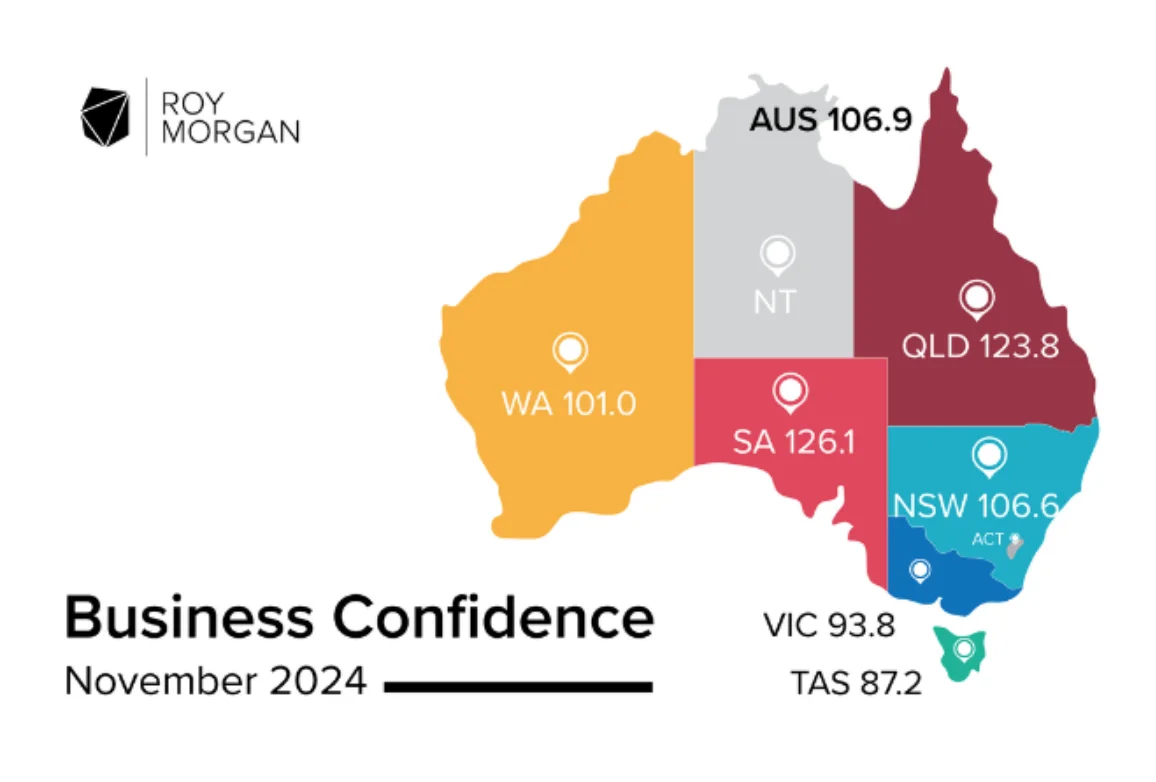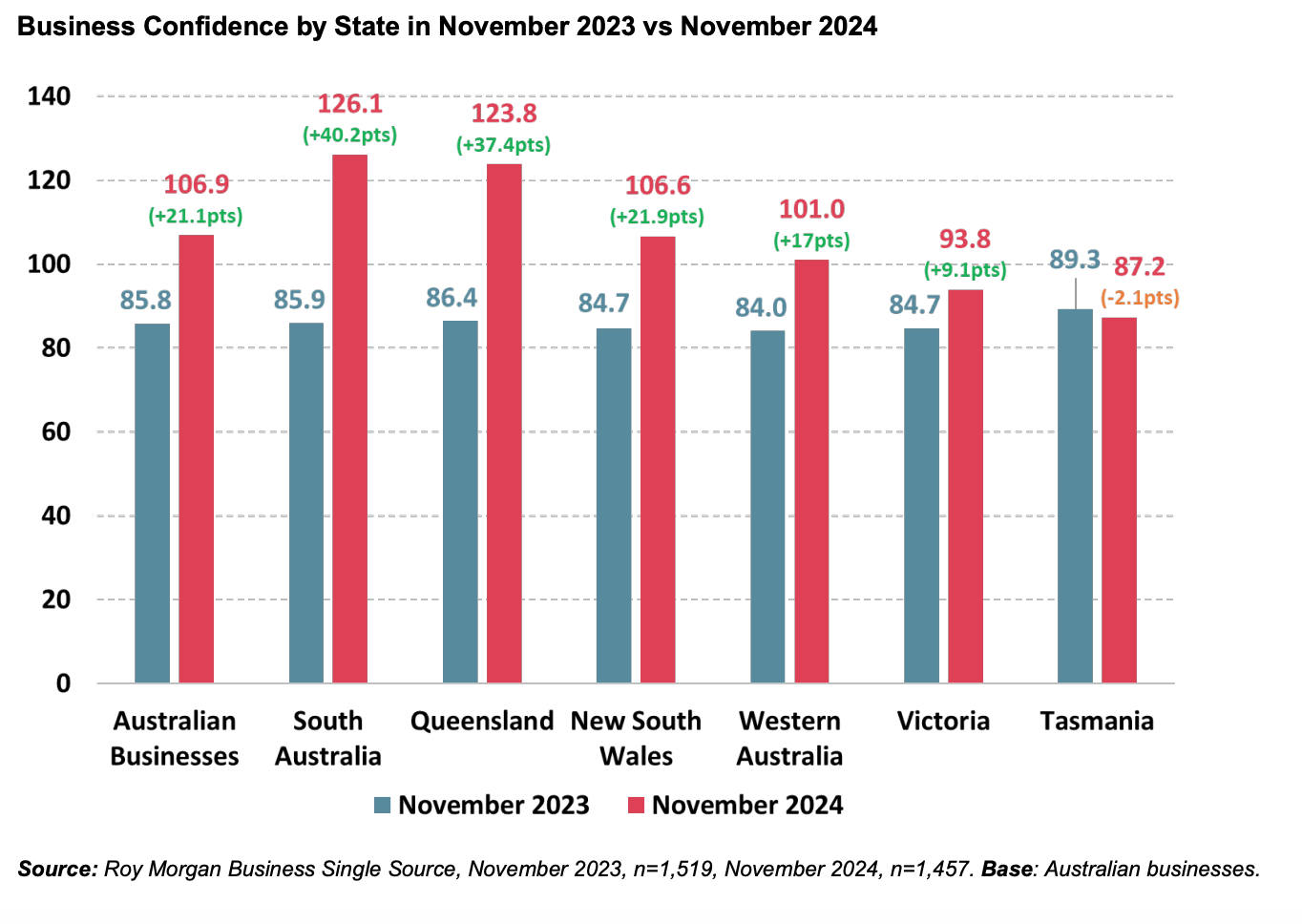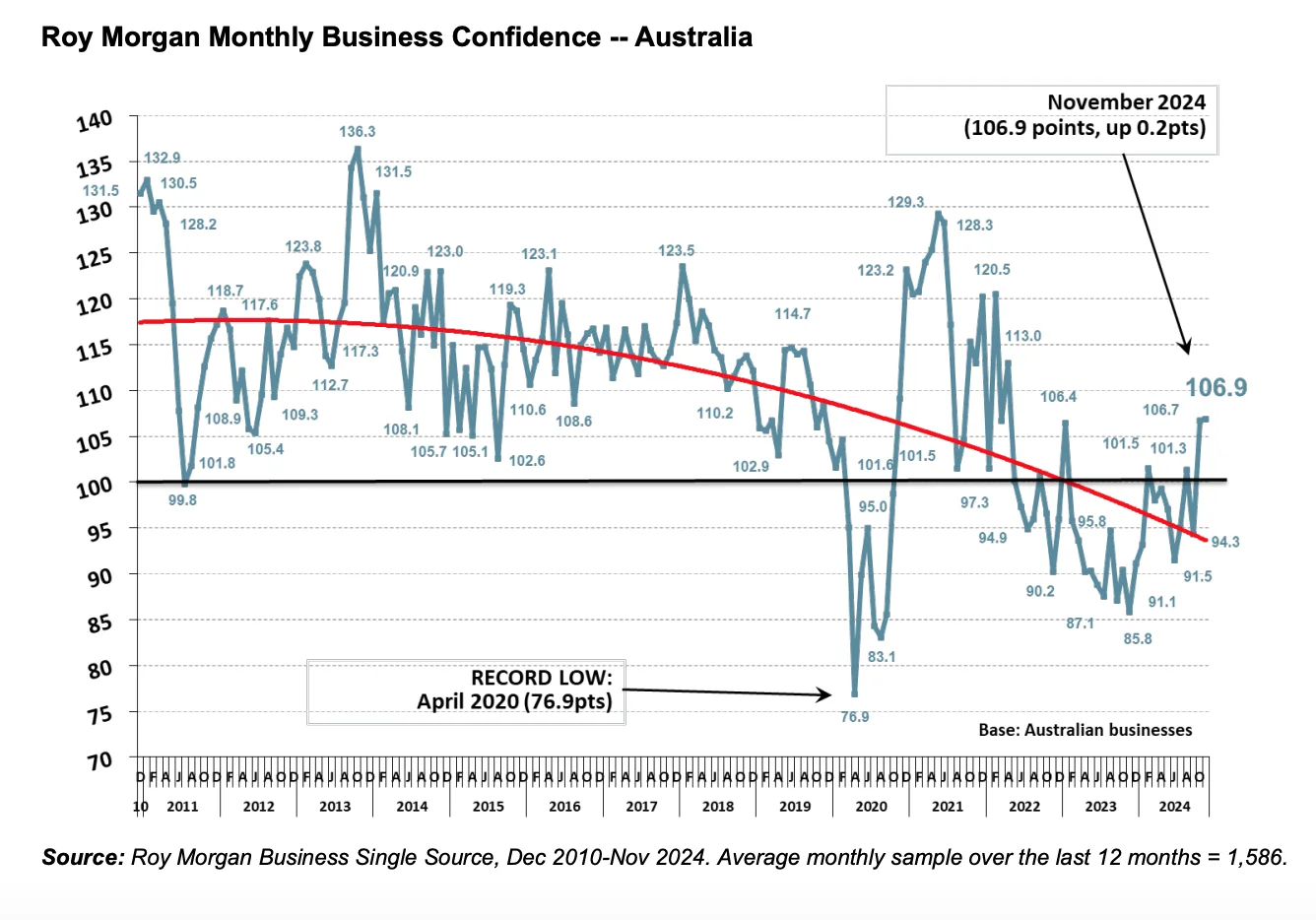Business confidence is at an all time high – but that’s not the whole story
The Roy Morgan Business Confidence rating for November 2024 was released this week, with the 106.9 score virtually unchanged from October 2024.
A business confidence score is a quantitative measure that reflects the level of optimism or pessimism that businesses feel about the state of the economy and their own prospects. It is typically derived from surveys conducted among business leaders, executives, or managers across various sectors. The score provides insights into how businesses perceive current economic conditions and their expectations for the future.
Despite the Reserve Bank leaving interest rates unchanged at a 13-year high of 4.35%, the Roy Morgan Business Confidence is “now at its most positive rating for well over two years since April 2022 and is the highest it has been since the Albanese Government was elected in May 2022.”
South Australia had the largest increase, up 40.2pts to 126.1 – the highest Business Confidence score of any State.

Some key stats from the report are:
- 46.3% of businesses (up 3.4ppts) say 2025 will be a ‘good time to invest’ compared to 34.9% (down 0.3ppts) that say it will be a ‘bad time to invest’ – the highest net rating for well over two years.
- 47.4% of businesses say they expect ‘good times’ over the next 12 months compared to 22.4% that expect ‘bad times’
- The most confident industry in October & November 2024 was Financial & Insurance Services on 137.5, followed by Public Administration & Defence on 137.5, followed by Education & Training on 131.9.

And while this new found confidence is great to celebrate, it’s important to remember that businesses have been on a rollercoaster ride since 2020 when confidence dropped to a record low in April due to the pandemic.

How Business Confidence Scores Are Used
- Economic Analysis
- Economists and policymakers use these scores to gauge the health of the economy. Higher confidence suggests likely increases in investment, employment, and production, whereas lower confidence signals caution.
- Forecasting Business Activity
- The score helps predict trends in business activity, including investment levels, hiring, and supply chain decisions.
- Policy Decisions
- Central banks and governments use business confidence data to inform monetary and fiscal policies, especially during periods of economic uncertainty.
- Market Sentiment
- Investors use business confidence as an indicator of economic growth, influencing stock market trends and investment strategies.
One way to help boost business confidence is via engaging market research – which plays a crucial role in business confidence by providing actionable insights, reducing uncertainty, and enabling informed decision-making. Here’s how businesses can use market research to enhance their confidence:
1. Understanding Customer Needs and Preferences
- How It Boosts Confidence: By identifying customer expectations, businesses can align their products and services to meet market demand effectively. This reduces the risk of launching unsuccessful products and instills confidence in their offerings.
- Example: Conducting surveys or focus groups to understand customer pain points and preferences for a new product.
2. Analysing Market Trends
- How It Boosts Confidence: Market research identifies emerging trends, helping businesses adapt to changes and seize new opportunities. Staying ahead of market shifts builds confidence in long-term strategic planning.
- Example: Using trend analysis to spot growth areas, such as increasing demand for sustainable products.
3. Competitive Analysis
- How It Boosts Confidence: Understanding competitors’ strengths, weaknesses, and strategies allows businesses to position themselves effectively and anticipate market moves. This reduces uncertainty about competitive threats.
- Example: Benchmarking against competitors to identify unique selling points or areas for improvement.
4. Improving Decision-Making
- How It Boosts Confidence: Market research provides data-driven insights that eliminate guesswork. Businesses feel more secure when decisions are backed by reliable data.
- Example: Using customer feedback to decide whether to expand into a new market.
5. Reducing Risk
- How It Boosts Confidence: Research minimises risks by testing ideas and products before full-scale implementation. This ensures better resource allocation and a higher likelihood of success.
- Example: Conducting pilot studies or A/B testing to refine a marketing campaign or product feature.
6. Identifying New Opportunities
- How It Boosts Confidence: By exploring untapped markets, segments, or product categories, businesses can uncover growth areas that boost optimism about their future prospects.
- Example: Discovering a niche audience through demographic research that is underserved in the current market.
7. Enhancing Communication and Branding
- How It Boosts Confidence: Research into customer sentiment and brand perception allows businesses to fine-tune their messaging, ensuring it resonates with their audience. Strong branding builds internal and external confidence.
- Example: Conducting sentiment analysis to tailor marketing messages for different customer segments.
8. Measuring Performance
- How It Boosts Confidence: Tracking business performance through customer satisfaction surveys, Net Promoter Scores (NPS), or other metrics provides clarity on what’s working and what needs adjustment. This reassures businesses about their strengths.
- Example: Using post-purchase surveys to measure customer satisfaction and loyalty.
9. Supporting Long-Term Planning
- How It Boosts Confidence: Research helps businesses anticipate future challenges and opportunities, enabling better strategic planning. Confidence in long-term goals reduces short-term anxiety.
- Example: Economic forecasting to prepare for potential market disruptions.
10. Building Stakeholder Trust
- How It Boosts Confidence: Market research outcomes can be shared with stakeholders (e.g., investors, partners) to demonstrate that the business is making informed and strategic choices. This boosts overall confidence in the organisation.
- Example: Presenting data-backed projections during investor meetings to secure funding.
Looking to boost your business confidence in the new year? Get in contact here.



